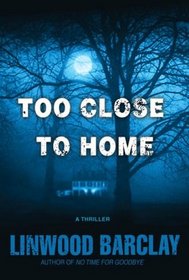Hmmm this was my first Barclay book and I'm a bit on the fence about it. I love first person, read a TON of first person (Including Lisa Gardner who excels at 1st person) so I'm VERY picky about my first person. For about the first 1/3 to 1/2 the first person is very clunky and awkward :( but I stuck with it. The last half or so was better (less clunky, better pacing)--mostly because (I think) there was more dialogue than anything.
Odd as my criticisms may sounds, I feel like I had a vested interst in seeing how it all turned out so I stuck with it. Keeping in mind that suspense and thrillers are my #1 genre of choice to read (meaning, I've read a lot and I'm really picky, as in, "Can you pass the Gardner test?" LOL)...There were no huge surprises here...In the end, I'm not 100% sure I bought into all the big reveals that went on. I def wouldn't read any of Barclays older books but MIGHT maybe give a newer book a try to see if the writing/plotting/etc has improved.
As usual, another good book by Linwood Barclay.
I thoroughly enjoyed the book and felt it was well written. This was the first Linwood Barclay book I have read and intend to read his others.
I was expecting more...seemes a little amateurish...
Very interesting, easy to read and stick with until the end, ending not what I expected. I have read his books before and liked them.
I really enjoyed this book and this author. The writing style is very fast-paced and really easy to read. He does a great job of giving personalities to the characters. You love them or hate them. I was very surprised by the ending and truly did not see it coming. I highly recommend this author and this book.
Very interesting, keeps your attention, easy to read and stick with. Outcome not what I expected.
An excellent page-turner: great plot, very well-developed, very readable and well-written.
My first Linwood Barclay but definitely not my last. Journalists who turn to thriller writing have a long and illustrious track record for knowing what they are doing: you could argue that it started with Edgar Allan Poe who, when the poor man wasn't dying in a ditch in Baltimore, put in some time as a journalist, of sorts, and in his spare time laid the foundations for modern thriller writing. Graham Greene. Ross MacDonald. Stephen King. Michael Connelly. Steig Larsson. Google it for yourself, it's quite an impressive list ...
What do journalists know about writing, that lends itself to thriller writing? Don't bury the lede. Structure: a story has an engine, and you have to keep it firing over. How evidence presents itself -- and adds up into a story. How dialogue enhances a story. What makes characters interesting, and either relatable or objectionable ... Or, as Elmore Leonard (who was not a journalist, but writes like one) says, "... leave out the part that readers tend to skip. ... If it sounds like writing, I rewrite it."
(I don't think it's a spoiler to say that part of the plot hinges on the manuscript of a literary novel that, we are told, was a huge best seller, and made the author a Literary Darling. And it's hilarious, it's so bad ... )
In Too Close to Home, Linwood Barclay has a cracker of a premise, frightening and all too plausible. The pages tick over nicely, with a steady stream of clues presented and random revelations turning out to have more importance than first appeared. The ending/solution to the mystery does not disappoint. (All too often, something that has been chugging along nicely falls flat at the end, as you're told that the cat did it. Or the person you suspected, and rejected as too obvious, on page 2.)
This falls in the much-honored category, in our house of "better than it needed to be." I'm going to get my hands on more Linwood Barclay.





